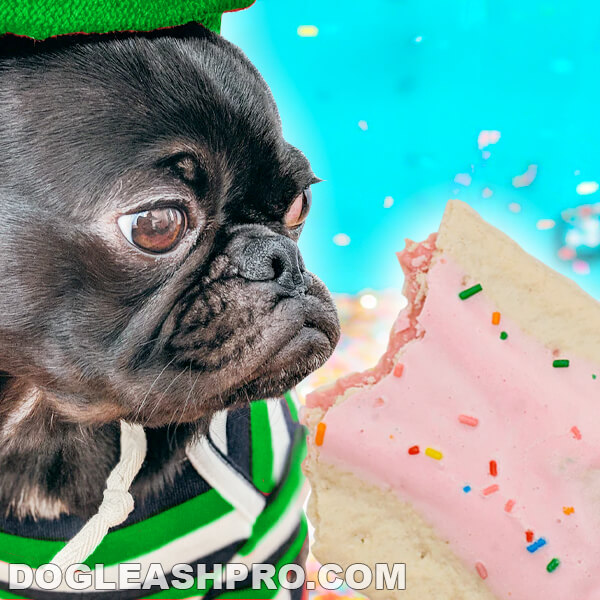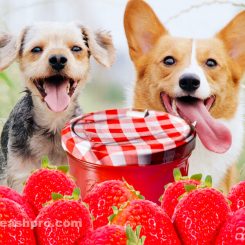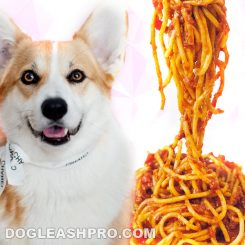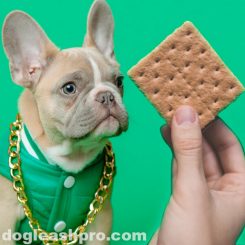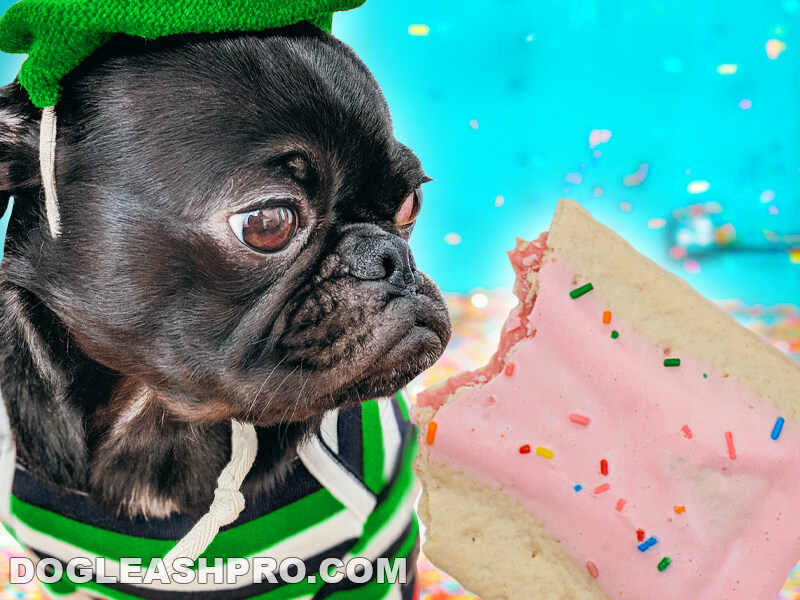
Pop Tarts are fun colorful treats that are made for human consumption. Once I left a half-eaten Pop Tarts on the dining table and my Labrador sneakily stole it and ate it. Before I could grab it out of her mouth, she had already devoured it. Like many dog owners, I became very concerned and wondered if Pop Tarts are safe for dogs to eat.
Can dogs eat Pop Tarts? It depends. While some Pop Tarts don’t contain any ingredients that are toxic to dogs, it is still not the best dog treat for our furry friends. Pop Tarts contain high levels of sugar, salt, carbohydrates, fats, and calories that can be harmful to our dog’s health. Some Pop Tarts may even contain xylitol which is toxic to dogs.
Table of Contents
Can dogs eat Pop Tarts?
Whether your dogs can eat Pop Tarts or not really depends on the following factors:
- Which Pop Tarts is being consumed.
- The ingredients in the Pop Tarts.
- Amount of Pop Tarts being ingested.
Let’s take a closer look.
Can dogs have Pop Tarts?
To fully understand whether dogs can have Pop Tarts, it’s important to take a look at what Pop Tarts are and what they are made out of.
What are Pop Tarts?
Pop Tarts are a popular snack in the United States, Canada, Ireland, United Kingdom, and New Zealand. Pop Tarts can be found in your local grocery stores and supermarkets. They are usually eaten as an afternoon snack and a sugary treat many children and adults look forward to. Pop Tarts comes in a variety of different flavors and sugary filings. The sugary flavor filling is sealed in between two thin layers of rectangular-shaped pastry crackers.
The majority of the Pop Tarts are also coated with sugary frosting.
You can find these different flavors of Pop Tarts:
- Brown sugar cinnamon Pop Tarts.
- Strawberry Pop Tarts.
- Blueberry Pop Tarts.
- Different kinds of cinnamon Pop Tarts.
- Chocolate Pop Tart.
- S’Mores Pop Tart.
What are Pop Tarts made of?
Before feeding our canine pals any treats or snacks, it’s important to know what the ingredients are in that specific snack. Let’s take a closer look at the ingredients in Pop Tarts.
Can dogs eat strawberry Pop Tarts?
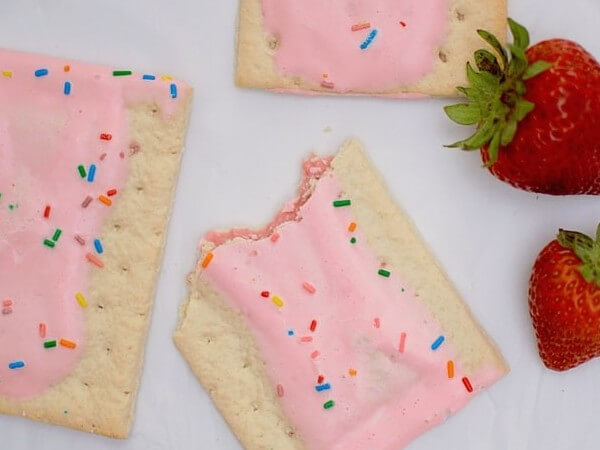
No, dogs should not eat strawberry Pop Tarts. It is full of sugar. If you must give your pooch strawberry Pop Tarts, make sure it is in small amounts and in moderation. Avoid feeding your pup the whole pastry bar, otherwise, it can cause weight gain, diabetes, and even pancreatitis in dogs.
If your furry friend is already suffering from diabetes, high blood pressure, or obesity, it’s best not to feed them any strawberry Pop Tarts.
Dogs with wheat allergies should not have strawberry Pop Tarts because it does contain wheat products and the type of oil that’s used is not good for dogs.
Here are the ingredients in Frosted Strawberry Pop Tarts:
- Enriched flour which includes wheat flour, niacin, reduced iron, thiamin mononitrate (Vitamin B1), riboflavin (Vitamin B2), and folic acid.
- Corn syrup.
- High fructose corn syrup.
- Dextrose.
- Soybean and palm oil with TBHQ for freshness.
- Sugar.
- Bleached wheat flour.
Frosted Strawberry Pop Tarts contains two percent or less of the following:
- Wheat starch.
- Salt.
- Dried strawberries.
- Dried pears.
- Dried apples.
- Leavening (baking soda, sodium acid pyrophosphate, monocalcium phosphate).
- Citric acid.
- Gelatin.
- Modified wheat starch.
- Yellow corn flour.
- Caramel color.
- Palm oil.
- Xanthan gum.
- Cornstarch.
- Turmeric extract color.
- Soy lecithin.
- Red 40.
- Yellow 6.
- Blue 1.
Can dogs eat brown sugar cinnamon Pop Tarts?
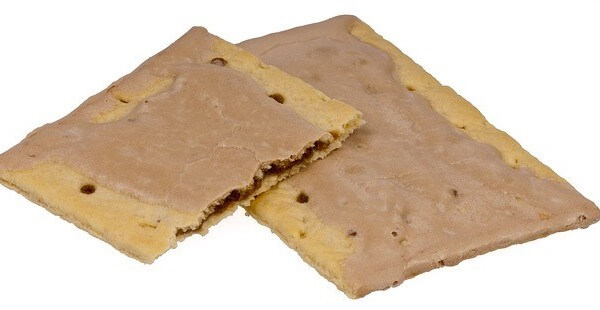
No, dogs should not eat brown sugar cinnamon Pop Tarts. The name of this snack is very misleading since there’s no actual brown sugar used to make brown sugar cinnamon Pop Tarts. Instead, the following is used to make the Pop Tarts sweet: sugar, corn syrup, dextrose, high fructose corn syrup, and molasses.
None of these are good for our dogs. Eating Pop Tarts every day can cause several health problems in dogs including weight gain, dental issues, diabetes, arthritis, and pancreatitis.
Be sure to only give your pooch brown sugar cinnamon Pop Tarts in moderation and as a rare occasional treat.
The brown sugar cinnamon Pop Tarts uses the same main ingredients as strawberry Pop Tart so if your furry pals have wheat allergies, they should not have brown sugar cinnamon Pop Tarts.
Here are the ingredients in Frosted Brown Sugar Cinnamon Pop Tarts:
- Enriched flour which includes wheat flour, niacin, reduced iron, thiamin mononitrate (Vitamin B1), riboflavin (Vitamin B2), and folic acid).
- Sugar.
- Soybean and palm oil with TBHQ for freshness.
- Corn syrup.
- Dextrose.
- High fructose corn syrup.
- Bleached wheat flour.
Frosted Brown Sugar Cinnamon Pop Tarts contains two percent or less of the following:
- Molasses.
- Salt.
- Leavening (baking soda, sodium acid pyrophosphate, monocalcium phosphate).
- Cinnamon.
- Wheat starch.
- Gelatin.
- Caramel color.
- Soy lecithin.
You may also be interested in: Can Dogs Eat Starburst?
Can dogs eat blueberry Pop Tarts?
Blueberry Pop Tarts also contain the same main ingredients as strawberry Pop Tarts and brown sugar cinnamon Pop Tarts. It also contains a lot of sugar and has wheat products.
As the name of this Pop Tart suggest, it will taste like blueberry. However, if you take a look at the ingredient list, it also contain dried grapes. Grapes, whether dried or not, are actually harmful to dogs so it’s best to avoid feeding your pooch blueberry Pop Tarts.
Here are the ingredients in Frosted Blueberry Pop Tarts:
- Enriched flour which includes wheat flour, niacin, reduced iron, thiamin mononitrate (Vitamin B1), riboflavin (Vitamin B2), and folic acid.
- Corn syrup.
- High fructose corn syrup.
- Dextrose.
- Soybean and palm oil with TBHQ for freshness.
- Sugar.
- Bleached wheat flour.
Frosted Blueberry Pop Tarts contains 2% or less of the following:
- Wheat starch.
- Salt.
- Dried blueberries.
- Dried grapes.
- Leavening (baking soda, sodium acid pyrophosphate, monocalcium phosphate).
- Dried apples.
- Citric acid.
- Modified wheat starch.
- Gelatin.
- Yellow corn flour.
- Natural and artificial flavor.
- Xanthan gum.
- Soy lecithin.
- Caramel color.
- Cornstarch.
- Turmeric extract color.
- Red 40.
- Blue 2.
- Blue 1.
As you can see, the different varieties of Pop Tarts above share many of the same main ingredients:
Enriched flour and bleached wheat flour are bad for dogs with wheat allergies
The two thin layers of rectangular-shaped pastry crackers are made with enriched flour, specifically wheat flour. If your furry pups have wheat allergies or have gluten sensitivity, then we highly recommend that you keep Pop Tart away from them.
Dogs will eat anything and everything they see and that includes the Pop Tart you left behind on that kitchen counter that was supposed to be for your kid’s afternoon snack.
Here are some signs of wheat allergy in dogs:
- Vomiting.
- Diarrhea.
- Upset stomach.
- Bloating or passing gas frequently.
- Red, inflamed, and itchy skin.
- Skin rashes.
- Itchy behind can cause dogs to scoot their behind on the floor.
- Frequent sneezing.
- Asthma.
- Difficulty breathing.
- Frequent licking of the paw pads and front paw pads.
DON’T MISS: My Dog Keeps Sitting On His Bum After Grooming: 10 Reasons Why!
Our four-legged friends aren’t always born with wheat allergies. In fact, some dogs become allergic to wheat when they are constantly exposed to wheat products. So when this happens, many dog owners are often confused and concerned.
If you’re not sure whether your K9 pals have a wheat allergy, the best course of action would be to take them to see the vet. Your vet will be able to perform a series of tests and let you know whether your pooch has a wheat or gluten allergy.
While many regular dog food uses enriched flour in their ingredients, our furry friends actually do not need wheat flour in their diet. Our canine’s diet should consist of meat for protein, vegetables for fiber, and canine-friendly grains. This will ensure that our pooch receives the necessary vitamins, minerals, protein, carbohydrates, and fats they need.
Enriched wheat flour is unnecessary for our dog’s diet. It is also highly processed which is how it got its name. During the flour processing, many of the natural nutrients are lost so the nutrients like the ones below are added back into the wheat flour:
- Niacin (Vitamin B3)
- Reduced iron.
- Thiamin mononitrate (Vitamin B1).
- Riboflavin (Vitamin B2).
- Folic acid (B9 or folate).
While these nutrients are great, they are considered too small of an amount to be beneficial to dogs. Our canine friends can get these nutrients from their daily food and instead of human snacks like Pop Tart.
Sugar, dextrose, corn syrup, and high fructose corn syrup are all sugar that dogs don’t need
There is a lot of sugar in Pop Tarts. It doesn’t matter whether you choose the strawberry Pop Tarts, brown sugar cinnamon Pop Tarts, or the blueberry Pop Tarts. They also contain tons of sugar that’s not healthy for our dogs.
You’ll see sugar, dextrose, corn syrup, and high fructose corn syrup listed in the ingredient section. They all mean the same thing: sugar!
In one strawberry Pop Tarts pastry, there are 16 grams of sugar. This is considered a lot of sugar for dogs and eating Pop Tarts regularly can cause many health issues in dogs including:
- Diabetes.
- Weight gain.
- Insulin resistance.
- Dental issues: cavities, tooth decay, and gum disease to name a few.
- Pancreatitis.
In fact, dogs don’t really need to consume sugar. They receive it naturally from carbohydrates from their regular dog food.
Soybean and palm oil with TBHQ is harmful to dogs
If your furry friends have soy allergies, it’s best to avoid feeding them Pop Tarts. Compared to other vegetable oils, soybean oil contains more saturated fats.
Both palm and soybean oil are not the healthiest type of oil for our K9 pals. The best oil for dogs is one of the following:
- Olive oil.
- Sunflower oil.
- Coconut oil.
- Fish oil.
- Flaxseed oil.
You’re also probably wondering what TBHQ is. It stands for Tertiary butylhydroquinone and it is usually used to keep the Pop Tarts fresh in order to prolong its shelf life. If you don’t know what it is or can’t pronounce the ingredient without looking it up, it’s best to skip that food.
There’s plenty of research out there that shows continuous consumption of food with TBHQ can cause cancer precursors in the dog’s stomach as well as DNA damage.
Knowing that there is TBHQ in Pop Tarts was enough reason for me to stop giving my pups any more of this sweet snack.
Fun Fact: Cheez Its cracker also uses soybean and palm oil with TBHQ for freshness! Find out if Cheez Its is safe for doggy consumption by checking out Can Dogs Eat Cheez Its?
Are Pop Tarts bad for dogs?
Yes, Pop Tarts are pretty bad for dogs since they are loaded with sugar, carbohydrates, salt, fats, and calories. We consider Pop Tarts to be an “empty calories” treat because it doesn’t provide any nutritional benefit for dogs.
So, can dogs eat Pop Tarts?
While many of the Pop Tarts varieties do not contain any ingredients that are toxic to dogs, it’s still best to avoid feeding your K9 friends this sugary snack.
Pop Tarts are packed full of sugar and there is no nutritional value in them for dogs. If your four-legged friends accidentally stole one and gobble it down, they should be fine. But do keep this snack away from dogs and provide it as an occasional rare treat.
DISCLAIMER: THIS WEBSITE DOES NOT PROVIDE MEDICAL ADVICE
The information, including but not limited to, text, graphics, images and other material contained on this website are for informational purposes only. No material on this site is intended to be a substitute for professional veterinary advice, diagnosis, or treatment. Always seek the advice of your veterinarian or other qualified health care provider with any questions you may have regarding dietary needs.
POP-TARTS is a registered trademark of Kellogg North America Company. Dogleashpro does not claim any ownership of the POP-TARTS name, logo, or any identifying mark in any way. This article is for educational purposes only.
Resources:
https://en.wikipedia.org/wiki/Pop-Tarts
https://www.avma.org/resources/pet-owners/petcare/diabetes-pets

With over five years of specialized experience as an animal writer, my expertise lies in dog nutrition, health, behavior, grooming, and training. I am dedicated to delivering helpful and informative content that caters to the well-being of our furry friends. My primary goal is to empower pet owners with knowledge and ensure our canine companions thrive in health and happiness. In my free time, I love volunteering at local dog rescue centers.
